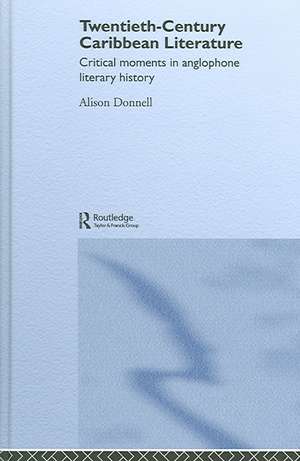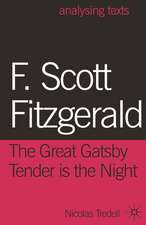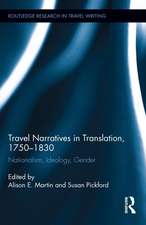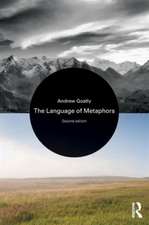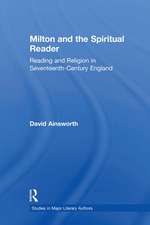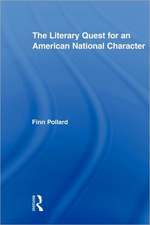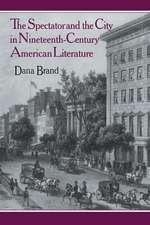Twentieth-Century Caribbean Literature: Critical Moments in Anglophone Literary History
Autor Alison Donnellen Limba Engleză Hardback – 24 noi 2005
Focusing on Anglophone or Anglocreole writings from across the twentieth century, Alison Donnell asks what it is that we read when we approach ‘Caribbean Literature’, how it is that we read it and what critical, ideological and historical pressures may have influenced our choices and approaches. In particular, the book:
* addresses the exclusions that have resulted from the construction of a Caribbean canon
* rethinks the dominant paradigms of Caribbean literary criticism, which have brought issues of anti-colonialism and nationalism, migration and diaspora, ‘double-colonised’ women, and the marginalization of sexuality and homosexuality to the foreground
* seeks to put new issues and writings into critical circulation by exploring lesser-known authors and texts, including Indian Caribbean women’s writings and Caribbean queer writings.
Identifying alternative critical approaches and critical moments, Twentieth-Century Caribbean Literature allows us to re-examine the way in which we read not only Caribbean writings, but also the literary history and criticism that surround them.
| Toate formatele și edițiile | Preț | Express |
|---|---|---|
| Paperback (1) | 368.51 lei 6-8 săpt. | |
| Taylor & Francis – 24 noi 2005 | 368.51 lei 6-8 săpt. | |
| Hardback (1) | 1017.91 lei 6-8 săpt. | |
| Taylor & Francis – 24 noi 2005 | 1017.91 lei 6-8 săpt. |
Preț: 1017.91 lei
Preț vechi: 1241.35 lei
-18% Nou
Puncte Express: 1527
Preț estimativ în valută:
194.78€ • 212.24$ • 164.13£
194.78€ • 212.24$ • 164.13£
Carte tipărită la comandă
Livrare economică 23 aprilie-07 mai
Preluare comenzi: 021 569.72.76
Specificații
ISBN-13: 9780415261999
ISBN-10: 0415261996
Pagini: 288
Ilustrații: Paper over boards
Dimensiuni: 156 x 234 x 18 mm
Greutate: 0.96 kg
Ediția:1
Editura: Taylor & Francis
Colecția Routledge
Locul publicării:Oxford, United Kingdom
ISBN-10: 0415261996
Pagini: 288
Ilustrații: Paper over boards
Dimensiuni: 156 x 234 x 18 mm
Greutate: 0.96 kg
Ediția:1
Editura: Taylor & Francis
Colecția Routledge
Locul publicării:Oxford, United Kingdom
Public țintă
Postgraduate and UndergraduateCuprins
Acknowledgements Introduction Difficult subjects: Caribbean writing before the boom Global villages and watery graves: recrossing the Black Atlantic Double Agents: gender, ethnicity and the absent woman Sexing the Subject: writing and the politics of sexual identity Works Cited
Recenzii
'This book will extend the archive of Caribbean texts in challenging and exciting ways, and is likely to initiate more generous and promiscuous readings of Caribbean writings, as well as making a valuable contribution to debates about the local and the global which are so central to postcolonial studies.' - Denise deCaires Narain, University of Sussex
'it amounts to nothing less than a radical challenge to the canon of Caribbean literature and its repressions. It is the only comprehensive sketch of all the major blindspots of Caribbean literary history and criticism, identifying and correcting not only the exclusions of nationalist canons, but also of post-nationalist and feminist ones. Donnell thus puts into critical circulation a rich, unruly, and diverse body of literature.'
- Shalini Puri, University of Pitsburgh
'This book will extend the archive of Caribbean texts in challenging and exciting ways, and is likely to initiate more generous and promiscuous readings of Caribbean writings, as well as making a valuable contribution to debates about the local and the global which are so central to postcolonial studies.' – Denise deCaires Narain, University of Sussex, UK
'it amounts to nothing less than a radical challenge to the canon of Caribbean literature and its repressions. It is the only comprehensive sketch of all the major blindspots of Caribbean literary history and criticism, identifying and correcting not only the exclusions of nationalist canons, but also of post-nationalist and feminist ones. Donnell thus puts into critical circulation a rich, unruly, and diverse body of literature.' - Shalini Puri, University of Pittsburgh, USA
Alison Donnell provides a thoroughly comprehensive guide to,and evaluation of, Caribbean literary criticism to date,as well as a justified counter position to its predominant paradigms in her recent - Wasafiri
For the most part Donnell excels in her task,that is to challenge and revise Caribbean literary criticism. Donnell brings to light a number of neglected texts while proving persuasive reasons as to why they should be included in the contemporary canon.She also provides a detailed description of regionalised literary criticism that has resisted diasporic imperatives. - Katherine Verhagen
' A stunning combination of survey, criticism, and informed reading' - Sue N. Greene, New West Indian Guide
‘Donnell deploys meticulous historiography and archival research, and engages the work the work of well-known theorists and a great many critics known and not so known: one gets the sense that the book itself is, at one level, an archive.’ - Curdella Forbes, The Journal of West Indian Literature
'The quality of her research, the clarity of her analysis and the bold objectivity of her arguments models a most responsible and thorough approach for anyone working through the highly politicized debates of Caribbean literature...Twentieth-Century Caribbean Literature is, rather, foundational for its comprehensive mapping and rigorous interrogation of Caribbean literature and its critical tradition. ' - Lara Cahill, Anthurium
'it amounts to nothing less than a radical challenge to the canon of Caribbean literature and its repressions. It is the only comprehensive sketch of all the major blindspots of Caribbean literary history and criticism, identifying and correcting not only the exclusions of nationalist canons, but also of post-nationalist and feminist ones. Donnell thus puts into critical circulation a rich, unruly, and diverse body of literature.'
- Shalini Puri, University of Pitsburgh
'This book will extend the archive of Caribbean texts in challenging and exciting ways, and is likely to initiate more generous and promiscuous readings of Caribbean writings, as well as making a valuable contribution to debates about the local and the global which are so central to postcolonial studies.' – Denise deCaires Narain, University of Sussex, UK
'it amounts to nothing less than a radical challenge to the canon of Caribbean literature and its repressions. It is the only comprehensive sketch of all the major blindspots of Caribbean literary history and criticism, identifying and correcting not only the exclusions of nationalist canons, but also of post-nationalist and feminist ones. Donnell thus puts into critical circulation a rich, unruly, and diverse body of literature.' - Shalini Puri, University of Pittsburgh, USA
Alison Donnell provides a thoroughly comprehensive guide to,and evaluation of, Caribbean literary criticism to date,as well as a justified counter position to its predominant paradigms in her recent - Wasafiri
For the most part Donnell excels in her task,that is to challenge and revise Caribbean literary criticism. Donnell brings to light a number of neglected texts while proving persuasive reasons as to why they should be included in the contemporary canon.She also provides a detailed description of regionalised literary criticism that has resisted diasporic imperatives. - Katherine Verhagen
' A stunning combination of survey, criticism, and informed reading' - Sue N. Greene, New West Indian Guide
‘Donnell deploys meticulous historiography and archival research, and engages the work the work of well-known theorists and a great many critics known and not so known: one gets the sense that the book itself is, at one level, an archive.’ - Curdella Forbes, The Journal of West Indian Literature
'The quality of her research, the clarity of her analysis and the bold objectivity of her arguments models a most responsible and thorough approach for anyone working through the highly politicized debates of Caribbean literature...Twentieth-Century Caribbean Literature is, rather, foundational for its comprehensive mapping and rigorous interrogation of Caribbean literature and its critical tradition. ' - Lara Cahill, Anthurium
Notă biografică
Alison Donnell is a Reader in English and Postcolonial Literatures at Nottingham Trent University. She is co-editor of The Routledge Reader in Caribbean Literature (1996) and has published widely in the field of Caribbean and postcolonial writings. She is also Joint Editor of Interventions: International Journal of Postcolonial Studies.
Descriere
A historiography of Caribbean literary history and criticism, the author explores different critical approaches and textual peepholes to re-examine the way twentieth-century Caribbean literature in English may be read and understood.
